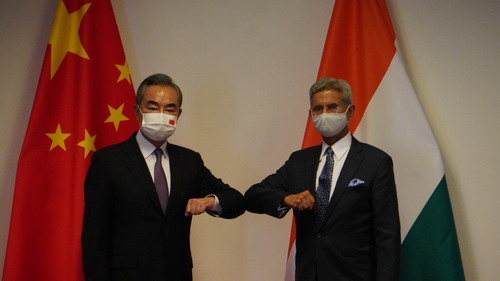|

On July 14, 2021 local time, State Councilor and Foreign Minister Wang Yi met with Indian External Affairs Minister Subrahmanyam Jaishankar in Dushanbe.
Wang Yi said that after the two foreign ministers' meeting in Moscow in September last year, the frontier troops of both countries disengaged in the Galwan Valley and the Pangong Lake areas, and the overall situation in the border area was de-escalated. Meanwhile, China-India relations still stay at a low level, which is not in the interest of either side. The nature of China-India relations is how two adjacent developing countries look at each other, co-exist in harmony and help each other succeed. China's strategic assessment of China-India relations has not changed. China and India pose no threat but offer development opportunities to each other. The two countries are partners rather than rivals or enemies. The principles of China-India relations should still be mutual respect for sovereignty and territorial integrity, mutual non-aggression, non-interference in each other's internal affairs, and mutual respect for each other's core interests. The interaction between the two countries should still be seeking mutual benefits and complementarity, pursuing healthy competition and avoiding confrontation, with cooperation as the main theme. Both China and India now shoulder greater responsibilities for their own regions as well as world peace and prosperity, and should pay more attention to the common strategic interests of both sides and bring more benefits to the two peoples.
Wang Yi pointed out that the rights and wrongs of what happened in the China-India border area last year are very clear and the responsibility does not lie with the Chinese side. China is ready to find a solution acceptable to both sides on the issue that needs emergency response through negotiation and consultation. The two sides must place the border issue in an appropriate position in bilateral relations, expand the positive momentum of bilateral cooperation and create favorable conditions for resolving differences through negotiation. We must consolidate the results of disengagement that have been achieved, strictly abide by the agreement and common understanding of the two sides, and refrain from taking unilateral actions in sensitive and controversial areas, in order to avoid any recurrence of tensions due to misunderstanding and miscalculation. We must take a long-term perspective and gradually move from emergency response toward regular management and control, to avoid unnecessary interruptions of border-related issues to China-India relations.
Subrahmanyam Jaishankar agreed with Wang Yi's general assessment of China-India relations and said as two major developing countries, India and China have a lot in common and should enhance cooperation in various areas. India has not changed and does not want to change the strategic assessment of India-China relations. India is willing to work with China to push bilateral relations out of a slump. India and China must find a solution to the border issue that is in the interest of both sides through dialogue and consultation and at the same time make sure not to take unilateral actions to prevent the situation from getting complicated. The Indian side thanks China for its support for the BRICS activities hosted by India.
Both sides believe the two countries must lift bilateral relations out of the low level and achieve healthy and stable development. The two sides encourage strengthening consultations on the border issue through the existing mechanism to consolidate the achieved results, and working towards turning emergency response to regular management and control to safeguard the peace and tranquility of the border area.
|